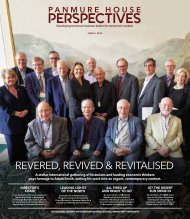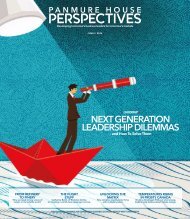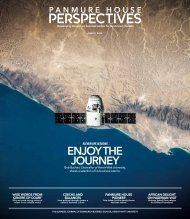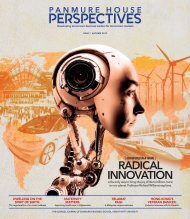Panmure House Perspectives - Issue 4, 2019
Panmure House Perspectives, the new international business journal of Edinburgh Business School, which showcases the best research undertaken by our doctoral students, interviews with major global business figures and viewpoints from leading academics from or own university and beyond.
Panmure House Perspectives, the new international business journal of Edinburgh Business School, which showcases the best research undertaken by our doctoral students, interviews with major global business figures and viewpoints from leading academics from or own university and beyond.
You also want an ePaper? Increase the reach of your titles
YUMPU automatically turns print PDFs into web optimized ePapers that Google loves.
AN APPRECIATION<br />
THE FINDINGS<br />
The key findings from the companies involved with<br />
the study were:<br />
1. THE IMPORTANCE OF PROPER TRAINING.<br />
Entrepreneurial behaviour is primarily encouraged by<br />
training and development courses. Middle managers’<br />
corporate entrepreneurial behaviour is influenced<br />
by the combination of internal factors and the<br />
specificity of their job function. All middle managers<br />
use top management support that encourages them<br />
to undertake entrepreneurial initiatives and adopt<br />
autonomous behaviour. Middle managers are actively<br />
engaged in idea-sharing using open communication<br />
and enthusiastically participate in training programmes<br />
for identification of new business opportunities.<br />
2. THE ALLOWANCE OF RISK-TAKING.<br />
Entrepreneurial endeavour stems from risk-taking,<br />
with senior management bearing responsibility, as is<br />
normal in UAE organisations where risk assessment<br />
is controlled from the top. Innovation also stems from<br />
project failure and learning from previous mistakes.<br />
Limited work autonomy and decision making coupled<br />
with the companies’ risk-averse attitude can often be<br />
balanced by a localised problem-solving approach<br />
within the team or department, and the freedom to<br />
choose the right environment to accomplish their<br />
tasks, such as working from home, or engaging<br />
with co-workers and clients in business lounges<br />
or coffee shops. Fast action can have a significant<br />
impact on sales when individuals are given freedom<br />
to lead online marketing initiatives with intensive<br />
interaction on different marketing platforms and active<br />
collaboration with offices in the UAE and around the<br />
globe.<br />
3. THE IMPLEMENTATION OF PROPER REWARD<br />
SCHEMES.<br />
Support for innovation through a reward system is<br />
crucial component of individual motivation to engage<br />
in innovative activities, and while such extrinsic and<br />
intrinsic inducements motivate employees, financial<br />
accolades are seen as poor remuneration for nonexistent<br />
career growth prospects, with many middle<br />
managers considering departures to other companies.<br />
To address such an eventuality, some companies<br />
promote only those managers whose ideas work<br />
and are profitable. Middle managers’ entrepreneurial<br />
efforts particular the ones which bring profit to the<br />
company are recognised and generously rewarded<br />
by well-established rewards and reinforcements<br />
system. All managers agreed that various rewards and<br />
reinforcements significantly motivate them to pursue<br />
to be creative and think outside the box.<br />
4. BETTER MANAGEMENT OF EMPLOYEE’S TIME.<br />
People need enough time to do their jobs. Increasing<br />
workloads can result in health problems which in turn<br />
can affect an individual’s ability to produce innovation.<br />
However, middle managers have the freedom to use<br />
their time as required, including longer ‘after hours’<br />
or during weekends, to work on projects of interest to<br />
them.<br />
Inadequate workload and time constraints<br />
coupled with limited work autonomy and inflexible<br />
structure were central impediments to corporate<br />
entrepreneurship causing numerous negative effects.<br />
In order to maintain control over workload and<br />
to meet deadlines, many middle managers become<br />
proactive by creating plans to deal promptly with<br />
critical issues.<br />
5. THE ESTABLISHMENT OF A FLUID HIERARCHY.<br />
Centralised organisational structures greatly benefit<br />
companies and protect them from unnecessary risk.<br />
However, the inflexible structure also hinders the<br />
ability of middle managers to balance the company’s<br />
top-down induced entrepreneurial behaviour with<br />
the autonomous behaviour of creatively minded<br />
employees. The result, in contemporary business<br />
environments, is tofrustrate the entrepreneurial<br />
process. The issue originates from a centralised<br />
structure common in the UAE and GCC (Gulf<br />
Cooperation Council) states. Organisations that are<br />
successful have tended to develop new business<br />
models where the hierarchical structure of rules and<br />
procedures, which can easily constrain entrepreneurial<br />
activity within the workforce, has been steadily<br />
improved and amended. Complicated and sometimes<br />
unclear rules, regulations and standards, most of which<br />
were observable in structure-related documentation,<br />
caused ineffective decision making and hindered<br />
entrepreneurial initiatives.<br />
6. CREATION OF A FLEXIBLE WORKFORCE.<br />
Middle managers advocate more agile networking<br />
structures where boundaries are still tightly defined<br />
and compliance with the rules and regulations is<br />
expected but where they can also capitalise on and<br />
experiment with prototypes. All managers in the<br />
sampled UAE companies embrace diversity and hire<br />
people from different nationalities and with different<br />
expertise in order to create new business models<br />
to pursue new business strategies. National culture<br />
had a strong effect on corporate culture, influencing<br />
employees not to admit their mistakes. Where the<br />
national culture had no tolerance for failure, it stifled<br />
decision making due to its historical tendency towards<br />
hierarchy, but was supportive of entrepreneurship as a<br />
new programme initiated by the government.<br />
WHAT DO MIDDLE MANAGERS WANT?<br />
From the middle manager’s side there are five points to<br />
achieve a balance between induced and autonomous<br />
behaviour:<br />
1. The support of the boss: Top management approval<br />
and a positive attitude towards entrepreneurialism,<br />
encouragement of idea sharing and open<br />
communication, reinforced by high-calibre training<br />
programmes, give middle managers confidence to<br />
undertake entrepreneurial initiatives enthusiastically.<br />
2. The motivation of rewards: Middle managers pursue<br />
innovative ideas knowing in advance what rewards<br />
they will get once their ideas are approved.<br />
3. The ability to make own decisions: When middle<br />
managers have freedom to set their own goals and<br />
objectives for innovation targets, approved by senior<br />
management, this is perceived as a vital mechanism for<br />
prevention of unnecessary risk.<br />
4. The opportunity to set own time: Most middle<br />
managers use about 10% of their time to develop<br />
personal contacts, networking and outside-the-office<br />
business meetings. Other managers use about four to<br />
six extra hours after work or at weekends to develop<br />
innovative ideas and to think beyond the confines of<br />
their jobs.<br />
5. The chance to problem-solve as an individual:<br />
Middle managers take a cross-disciplinary problemsolving<br />
approach to find a balance between a<br />
hierarchical structure with high bureaucratic intensity<br />
and their sole responsibility for the assigned tasks to a<br />
situation where problems can be solved locally by the<br />
members of the department.<br />
In conclusion, Dr Arnaut said: “A well-placed<br />
promotional system opens an opportunity for middle<br />
managers to act more autonomously and to have<br />
greater freedom in decision making. The free flow<br />
of information and open communication across all<br />
levels of the company encourages a high level of<br />
entrepreneurialism and the sharing of new ideas.’’<br />
Reward programmes which are well defined are<br />
one of the strongest constructs for motivation of<br />
entrepreneurial ideas among middle managers.<br />
Dr Arnaut pointed out that there are often tensions<br />
between induced and autonomous entrepreneurial<br />
behaviour. She said companies must also be<br />
aware of the influence of national local culture on<br />
organisational culture and entrepreneurial intentions<br />
in a multinational company.<br />
Among her recommendations, she stated: “ensure<br />
that HR policies are in place such as clear job<br />
description, comprehensive procedures establishing<br />
working hours, and describing under which particular<br />
circumstances overtime is allowed. Various training<br />
programmes must be focused on building employees’<br />
capabilities and aligning entrepreneurial activities<br />
efficiently.’’<br />
On the wider front, she stated that special attention<br />
must be paid to corporate governance and culture.<br />
Compliance with global standards is crucial.<br />
“The mistake from industry is that it does not ask<br />
the regulator questions, and the regulator thinks that<br />
all rules are understood and all requirements are<br />
achievable.’’<br />
The challenge is how to establish open channels<br />
of communication between governmental regulations<br />
and industry.<br />
“On a bigger scale, the UAE business environment<br />
is facing a huge challenge today: the government’s<br />
role as a regulator must achieve the balance between<br />
entrepreneurial spirit of UAE-based companies and<br />
governmental laws and regulations. To find this balance<br />
is not easy but must be done,’’ she concluded.<br />
An investigation of how middle managers address the balance between<br />
autonomous and induced strategic entrepreneurial behaviour in the UAE<br />
context, Dr Marina Arnaut, Doctor of Philosophy, Edinburgh Business School,<br />
Heriot-Watt University, March 2018.<br />
A polymath in Adam Smith’s footsteps:<br />
PROFESSOR EMERITUS GAVIN KENNEDY<br />
GAVIN KENNEDY, one of the enthusiastic instigators of the <strong>Panmure</strong> <strong>House</strong> project and a modern interpreter of<br />
Adam Smith’s work, passed away on Thursday, 25 April <strong>2019</strong>. He served as Professor and Director of Contracts at<br />
Edinburgh Business School from 1998 to 2005. He was 79. PROFESSOR ALEX SCOTT writes.<br />
Gavin Kennedy was one of the most dazzling and<br />
influential thinkers of his generation. He was a genuine<br />
Scottish polymath as an economist, author, political<br />
thinker, innovator and business figure. He would have<br />
been at home, holding his own, in the drawing room of<br />
<strong>Panmure</strong> <strong>House</strong> in the 1780s.<br />
Born in Yorkshire and of Scottish descent, it was not<br />
until his 20s that he arrived in Glasgow to study economics<br />
at Strathclyde University, graduating with a BA in 1965.<br />
His secondary education was at London Nautical School<br />
which he left at the age of 15 with no qualifications. He<br />
emigrated to Australia, where, as a young Marxist, he<br />
discovered the writings of David Ricardo, who invented<br />
the economic theories of comparative advantage and<br />
economic rent.<br />
After graduating from Strathclyde University, Gavin<br />
taught at East London College where he attended a<br />
lecture by the human resources manager of Shell Oil. The<br />
manager invited him to attend union negotiations to see<br />
how wage bargaining worked in practice. He wrote an<br />
MSc thesis on collective bargaining and the seeds of his<br />
later work on negotiation were sown.<br />
He went to Brunel University where he stood in as<br />
a lecturer at the National Defence College. This sparked<br />
his interest in defence economics and Gavin completed<br />
a PhD on the measurement of defence expenditures in<br />
developing nations. He served first as a member, then as<br />
chairman of the UK standing commission for UNESCO<br />
and subsequently as Professor of Defence Finance at<br />
Heriot-Watt University.<br />
He returned to Strathclyde as a senior lecturer in<br />
1973. He was, and remained, a most gifted and inspiring<br />
teacher and his 9 am lectures in the Royal College in<br />
George Street to over 350 students, repeated in the<br />
afternoon, were a masterclass not only in economic<br />
theory and practice but also in presentation.<br />
As a radical economic thinker, he helped shape the<br />
Scottish National Party’s economic policy in the 1970s<br />
and 1980s. He edited the book The Radical Approach<br />
which looked at Scotland’s future and an independent<br />
nation.<br />
He was inspired by the reawakening of Scottish<br />
nationhood and was part of the 79 Group calling for a<br />
Scottish socialist republic. However, his views mellowed<br />
and he was elected to the SNP’s party’s national executive,<br />
and he stood unsuccessfully in the General Election of<br />
1979 as an SNP parliamentary candidate for Edinburgh<br />
Central.<br />
While he was waiting for economic statistics in<br />
the Public Record Office in Kew, he noticed on display<br />
the log of the Royal Navy ship Bounty, of Mutiny on the<br />
Bounty fame. Conventional wisdom had it that Captain<br />
Bligh was a tyrant and Fletcher Christian, the leader of<br />
the mutineers, was a saint. Gavin reckoned that Captain<br />
Bligh had been unfairly maligned and wrote Bligh, which<br />
exploded the myth that Bligh had been a tyrannical<br />
captain.<br />
Gavin turned his attention to Adam Smith’s Wealth of<br />
Nations, discovering it afresh and his revelations develop<br />
the stages of effective negotiation.<br />
A stream of books, such as Negotiation, Strategic<br />
Negotiation and Influence, Kennedy on Negotiation,<br />
followed.<br />
In 1980 he left Strathclyde for a professorial chair<br />
at Heriot-Watt University, and in 1986 he founded a<br />
company, Negotiate, to commercialise his teaching. He<br />
would train thousands of managers in the techniques<br />
that remain a part of the curriculum at Edinburgh<br />
Business School.<br />
Gavin guided the transition of The Esmee Fairbairn<br />
Research Centre into Edinburgh Business School and<br />
was the architect of the charitable structure which<br />
made it possible for EBS and Heriot-Watt University to<br />
develop together. In 2013 the University awarded Gavin<br />
the honorary degree of Doctor of Letters in recognition<br />
of his accomplishments and his continuing support of<br />
Edinburgh Business School and the development of<br />
<strong>Panmure</strong> <strong>House</strong>.<br />
34 PANMURE HOUSE PERSPECTIVES ISSUE 4 ISSUE 4 PANMURE HOUSE PERSPECTIVES 35







